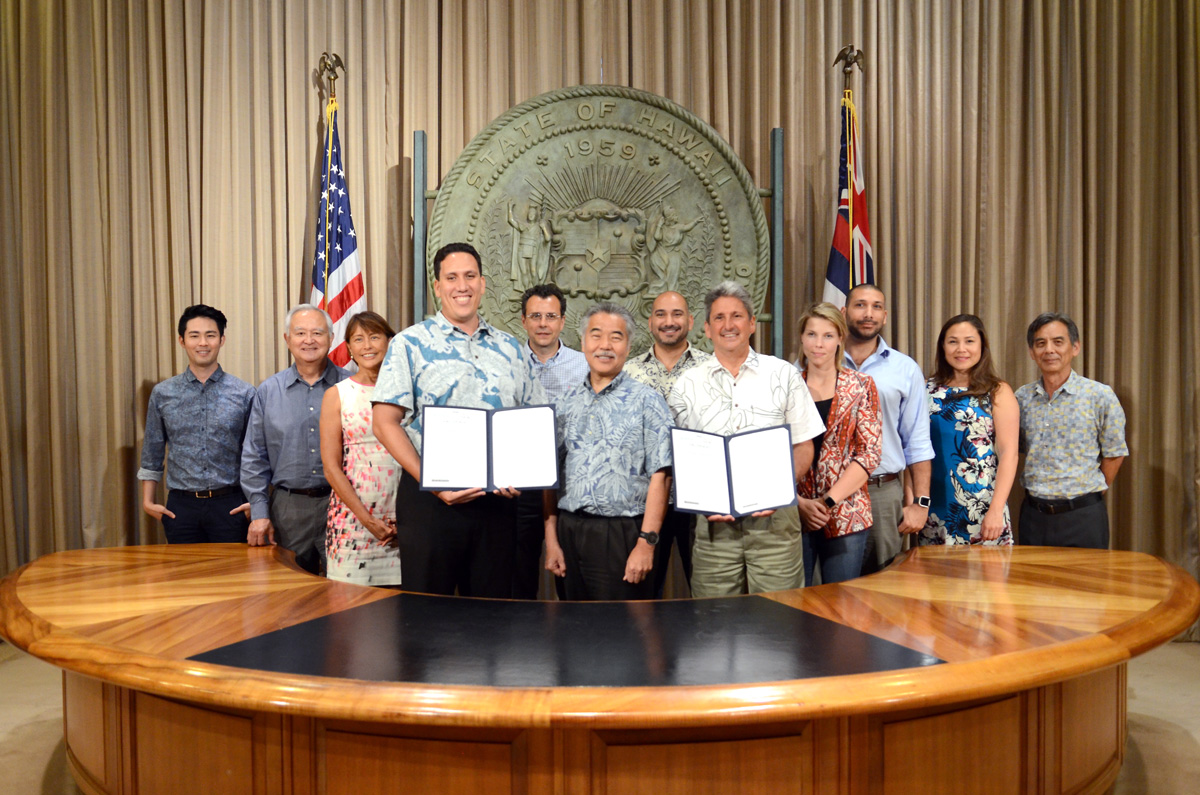
L-R: UH Regent Brandon Marc Higa, HBR Exec. Director Gary Kai, UH Regent Chair Jan Sullivan, Rep. Jarrett Keohokalole, UH VP for Research and Innovation Vassilis Syrmos, Gov. David Ige, XLR8UH Managing Partner Omar Sultan, UH President David Lassner, XLR8UH Prog. Assoc. Kate Poljakova, XLR8UH Managing Partner Tarik Sultan, HVCA President Meli James, UH Corp. Counsel Presley Pang
The University of Hawai‘i (UH) and the Hawai‘i business community have been working together to help diversify the state’s economy – which is highly dependent on the ebb and flow of the tourism and military sectors. Known as the Hawai‘i Innovation Initiative, one of four priorities set forth in UH’s Strategic Directions, 2015-2021, the goal of this bold effort is to build a thriving innovation, research, education and training enterprise that will help develop a third major economic sector for the state, create high-quality living wage-jobs and address regional and global challenges.
Despite great strides in creating the necessary infrastructure at UH and successful outreach efforts, the initiative was hindered by restrictive statues that limited UH’s ability to participate in technology transfer and commercialization activities. However, after years of diligently working and patiently educating the Legislature on the subject, these restrictions were lifted. On June 19, 2017, Governor David Ige signed into law two legislative measures to facilitate the transformation of discoveries and inventions generated by UH research into commercially viable enterprises that will broaden workforce opportunities for the state, help to diversify the economy, and will deliver innovative and useful products to the public. Additionally, these laws will keep UH competitive with its peer research institutions that have similar technology transfer and commercialization programs.
The first measure, Act 38, Session Laws of Hawai‘i (introduced as House Bill 425), exempts technology transfer activities conducted by the University of Hawai‘i from the scope of certain sections of the State Ethics Code, and confers the regulatory and oversight responsibilities for such technology transfer activities to UH. Previously, the State Ethics Commission determined whether public-private technology transfer arrangements are permissible or prohibited under general ethic principles. Act 38 “sunsets” on June 30, 2022 and UH must report yearly to the Legislature on the implementation of its regulatory framework.
The second measure, Act 39, Session Laws of Hawai‘i (introduced as House Bill 847), provides broad statutory authority to the University of Hawai‘i to engage in activities to support UH-based startup companies. These activities include participating financially directly or indirectly in start-ups, providing strategic marketing and networking resources, and offering hands on instruction and mentoring to the new entrepreneurs. Act 39 provides more express authority for certain programs that are currently underway at UH, such as the XLR8UH accelerator, and is patterned after a similar law for the state’s department of business, economic development and tourism. Act 39 “sunsets” on June 30, 2021 and requires a biennial report to the Legislature.
Together, Act 38 and 39 takes UH a step closer to realizing its full potential to contribute to the state and the public, and allows the university to keep pace with its peer research institutions and maintain its competitiveness in attracting research sponsors and research talent.
ACT 38
The intent of Act 38 is to allow the University of Hawai‘i to adapt the general ethics principles set forth in the State Ethics Code to current-day realities of shared commercial enterprises at public universities that are supported by both public and private resources. Act 38 exempts technology transfer activities, but does not exempt UH personnel per se from the State Ethics Code (Chapter 84). The University of Hawai‘i will exercise oversight over technology transfer activities to ensure that public university resources are appropriately used where there is private benefit. The University of Hawai‘i will also assess whether the allocation of any potential newly created economic value among the various stakeholders – – the inventor, UH and private investors — is fair and consistent with collectively bargained for rights and benefits under applicable collective bargaining agreements with faculty and administrators, professionals and technical staff.
Act 38 provides that the following sections of the State Ethics Code do not apply to “technology transfer activities” so long as the activities are sponsored by UH and comply with its regulatory framework and research compliance and policies.
- Section 84-12 regarding the use of confidential information;
- Section 84-13 regarding, in part, the use of state time, equipment or facilities for private business purposes;
- Section 84-14 through 84-15 regarding conflict of interests and contracts with companies in which an employee has a controlling interest;
- Section 84-18 regarding post-employment restrictions
Note: Financial interests disclosures under Section 84-17 of the Ethics Code (to the extent applicable) and gift disclosures required by Section 84-11 of the Ethics Code still apply to UH employees.
ACT 39
Under the laws governed under Act 39, the University of Hawai‘i is expressly authorized to:
- Contribute UH funds directly or indirectly to finance concepts or proposals that are likely to lead to viable business using university research;
- Evaluate and assist in the preparation of business plans;
- Provide instruction, training, and marketing assistance to support and promote projects in which UH invests;
- Prepare and distribute technical studies, reports and bulletins of interest to Hawai‘i’s innovation sector;
- Organize and sponsor conferences, workshops, seminars relating to the formation and financial viability of business that use UH research products;
- Retain consultants or advisory committees to help implement innovation programs
The new laws can be found at:
http://www.capitol.hawaii.gov/session2017/bills/HB425_CD1_.pdf
and
http://www.capitol.hawaii.gov/session2017/bills/HB847_CD1_.pdf
For additional guidance or questions, please contact the UH Office of the Vice President for Research and Innovation at (808) 956-5006 or uhovpri@hawaii.edu.
